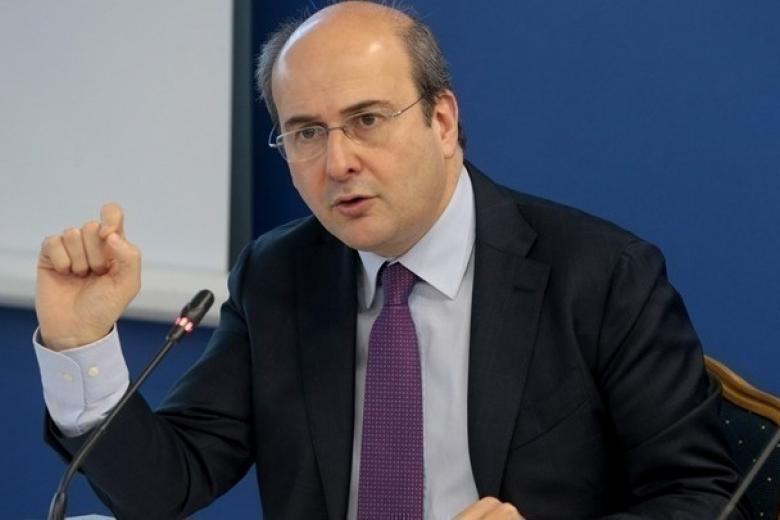The Minister of National Economy and Finance, Kostis Hatzidakis, today put the draft law “Measures to limit tax evasion” into public consultation. The draft law includes reforms aimed at addressing the problem of tax evasion holistically and at multiple levels, tax justice and securing the required resources to strengthen social policy.
The interventions implemented with the bill include:
- The mandatory posting of income and expenses in MyData within 2024.
- The ban of the use of cash in the purchase and sale of real estate.
- The new fair system of taxation of the self-employed.
- The increase of the fine for the use of cash in transactions over 500 euros, to an amount twice the transaction.
- The regulation of the short-term rental market.
- The cessation of cooperation of fuel trading companies with smuggling offenders.
In addition, the reform is complemented by the following interventions that do not require legislative regulation and will be implemented through administrative acts:
- The completion of the interconnection of cash registers machines with POS in the first months of 2024.
- The extension of the obligation to have an electronic payment system (EFT/POS) to the remaining sectors of the retail market that currently do not have one.
- The activation of the digital consignment note, pilot from the beginning of 2024 and fully by the end of the year.
- The mandatory electronic invoices within 2024 for which a relevant request has been submitted to the EU.
The Minister of National Economy and Finance, Kostis Hatzidakis, said: “This bill is a serious reform effort to tackle tax evasion . The government intervenes on many different levels in order to have tangible results for this big problem: Expanding electronic transactions, limiting the use of cash, strict measures to combat smuggling, modernizing the framework for short-term rentals, a fairer way of taxing freelancers, so that employees and pensioners do not feel victimized by tax policy. With all these initiatives we will be able to reduce tax evasion and support our social policy accordingly, starting with health and education, as will be seen in the 2024 budget. Without increasing taxes, through all these initiatives that limit delinquency and tax evasion, social policy in Greece will acquire a more substantial content. While at the end of the journey, of course, with the resulting fiscal margin, there is always the goal of further reducing tax rates.
Today we are putting this bill into consultation, waiting for observations, comments, objections, counter-proposals. We promise to consider all comments honestly and impartially. After all, this is the added value of the consultation.
But in any case, it would be wrong for society itself to change the philosophy of this of the bill and to maintain known pathogens. Because our main pursuit through this legislative initiative is to have a stronger sense of social justice. And this is, I imagine, a common pursuit of all of us”.
Especially the most important points of the draft law are the following:
- Limiting the use of cash
– Real estate purchases will be exclusively using bank means of payment. Contracts stating partial or full payment of the price in cash are void.
– Fines for purchases over 500 euros in cash, currently 100 euros, are increasing to twice the value of the transaction.
- Transparency in audits
– Mandatory electronic transmission of accounting files to AADE is established . It is stipulated that tax deductions and deductible expenses are not taken into account, if the documents on which they are based have not been transmitted electronically to AADE, as well as that the income from business activity cannot be less than the expenses that have been transmitted to the platform.
– Indirect control techniques for determining income are expanded (these techniques are based on evidence such as bank deposits, cash expenditures, taxpayer liquidity, etc. a.). The provision stipulates that indirect techniques will be used in three more cases (in addition to those already in force), which are as follows:
- when it is declared loss in at least three consecutive years and the method of financing the business, which covers its obligations, does not appear,
- when there is a significant mismatch between purchases, sales and stocks,
- when the gross profit factor resulting from the declared results is different from the one resulting from the purchase and sales documents.
Indirect techniques are already applied in the cases that the accounting standards or the Tax Procedure Code are not applied, as well as if the tax data are not submitted to the Tax Administration after two invitations (instead of the one that applies now).
– A cash bonus equal to ten times the value of the transaction (with a minimum of 100 euros and a maximum of 3,000 euros) is provided for citizens who make complaints about counterfeit cash registers through the “Appodixi” application, which result in an audit and the imposition of a fine .
– Establishes the possibility of audio or video recording with cameras during tax/customs controls.
– Sanctions for forgery, fuel smuggling or obstruction of control are tightened: the installation is sealed for two years, while it is stipulated that the natural or legal persons whose installation was sealed cannot be active in the distribution of energy products also for two years from the discovery of the infringement.
– Obligations are introduced for fuel trading companies to take preventive measures (“due diligence”) for counterfeiting and smuggling of fuel at the stations they cooperate with. Among other things, they are required to check whether the gas stations have the input-output control system, as well as the required licenses and certificates. They are also required to do at least one fuel quality check per year. In case of violations, the companies will stop the cooperation, will withdraw their sign from the offending stations and will inform the AADE.
- Short-term rentals
Regulations are introduced to ensure equal competition in the tourism market, the intersection of incomes and the strengthening of the short-term rental industry. Specifically, it is provided that:
– Natural persons who have three or more properties on short-term lease are required to start a business activity. The income obtained by legal entities, from the short-term rental of real estate, is considered income from business activity and is subject to VAT.
– Fines are increasing for not registering in the “ Register of Short-Term Accommodation Properties”, at 50% of the gross income of the last tax year and a minimum of 5,000 euros (today the fine is 5,000 euros).
– Defined as short-term the rental of a property, regardless of whether it is posted on a digital platform or not, for a period of less than sixty days each time and as long as no other services are provided, apart from accommodation and the provision of bed linen.
– Extends to short-term leases the accommodation fee for non-residents, which is 0.5% of the income.
– The accommodation tax is abolished and the “climate crisis resilience fee” is established, in hotels, rooms for rent, tourist villas, short-term rentals and tourist villas. The fee scales during the months of March to October from 1.5 to 10 euros per day and from November to February from 0.5 to 4 euros per day.
- Fair taxation system for the self-employed
Establish the minimum presumptive profit of the exercise of individual business activity, as well as the reduction by 50% of the application fee for self-employed persons, who declare incomes higher than the presumption, while for those who declare lower incomes, the fee is reduced by 25%. The basic philosophy of the bill is that the personal contribution of each freelancer to his individual business cannot be valued at a level lower than the income of an employee paid at the minimum wage. In order not to have an egalitarian perception, the amount of this personal contribution is increased according to the years of professional activity, the total payroll and the amount of the company’s turnover. Specifically, for the calculation of taxation, the following are taken into account:
a) The current minimum wage increased by 10% for every 3 years of professional activity after the first six years or the higher annual salary that the self-employed person pays to his employee. The larger of the two amounts is taken into account, with a maximum limit of 30,000 euros in each case.
b) Increase factor of the amount resulting from the previous criterion, in the cases whose annual turnover is higher than the industry average. The surcharge is 35% for those with a turnover greater than the average, 70% for a turnover greater than 150% of the average and 100% for a turnover exceeding twice the average.
c) 10% of staff payroll costs with a limit of 15,000 euros.
The minimum presumed profit is set at a maximum of 50,000 euros and is the sum of three coefficients.
It is stipulated that the presumption is not applied during the first three years of professional activity, for the fourth year it is reduced by 67% and for the fifth year by 33%.
It is reminded that the presumption is rebuttable. The bill specifies the conditions for the taxpayer to challenge the presumption. In more detail:
Taxpayers can dispute the presumption in the cases in particular where:
a) are serving their military service,
b) are imprisoned,
c) are hospitalized in a hospital or clinic,
d) are unable to exercise due to pregnancy or childbirth based on labor legislation,
e) have been demonstrably affected by extensive natural disasters that have made it impossible, in whole or in part, to exercise their professional or business activity,
f) are subject to the revocation of their individual business license or their professional license,
g) are subject to a ban on the operation of the store or another place of exercising their professional or business activity in implementation of a decision of a public authority for reasons of public health protection or another reason dictated by the public interest,
h) provide evidence from which it is proven that for reasons of force majeure they did not carry out business activity for a specific period of time.
In any case the taxpayer must provide the necessary supporting documents to prove the of his claims.
The bill stipulates that professionals with a disability equal to or greater than 80% are exempt from the application of the presumption. The presumption is reduced by 50% for professionals who carry out an activity and have their main residence in settlements with a population of up to 500 inhabitants and on islands with a population of less than 3,100.
Any income from wages, pensions or from agricultural business activity is included to meet the presumption. For example if the presumption for a professional is determined at 12,000 euros and he has an income from wages of 7,000 euros, the presumption is reduced to 5,000 euros (12,000-5,000).
A transitional provision is defined whereby professionals who will be taxed on this year’s (2023) presumptive income will pay a 50% reduced advance tax in 2024.
In order to deal with abusive actions, it is defined that a taxpayer who interrupts the free profession and participates as a sole shareholder or partner in a sole proprietorship that carries out the same business activity, can be taxed by the presumption if the comparison of the taxes in the two cases results in a lower tax charge.
It is provided that the surcharge due to KAD does not apply when the average annual turnover of the corresponding K.A.D. does not exceed 10,000 euros or when the number of claims that fall under the specific K.A.D. it does not exceed 30. It is also clarified that for the calculation of the average turnover, non-profits with zero turnover are not taken into account.
For professionals who declare losses and are taxed with the presumption, it is provided that the losses are not carried forward to be offset against the profits of subsequent years.
- Other settings
A number of new settings are introduced including among others:
– Greater tax reduction for building upgrade expenses. Expenditures for purchasing goods and receiving services related to energy, functional and aesthetic upgrading of buildings, which have not already been included or will not be included in a building upgrading program, reduce, equally distributed over a period of five years, the income tax of natural persons, up to the corresponding tax for each year, with a maximum total expenditure limit the 16,000 euros. It is recalled that under the current regime only 40% of the expenditure is deducted (this limit is abolished by the bill) while the expenses are only taken into account for the works and not for the materials (which are included in the bill).
– As it was already known, the capital accumulation taxes (from 0.5 to 0.2%) and stock market transactions are reduced by 50%, to 1 per thousand.
– For the tax returns of spouses, it is provided that the return can be submitted separately, as long as at least one of the spouses chooses to do so with their declaration by February 28 of the year submission of the statement. The choice of separate declaration is binding for the other spouse as well, it is irrevocable for the first year it concerns and is valid for every subsequent tax year, if it is not revoked by February 28 of the corresponding year.
The text of the draft law has been posted at http://www.opengov.gr/minfin /?p=12178. The consultation will run until Monday 27 November. Participation in the consultation is free.






